
August 2019
Olli Weiss,
1985 – 2019
A
Revolutionary Class Fighter
for the Oppressed
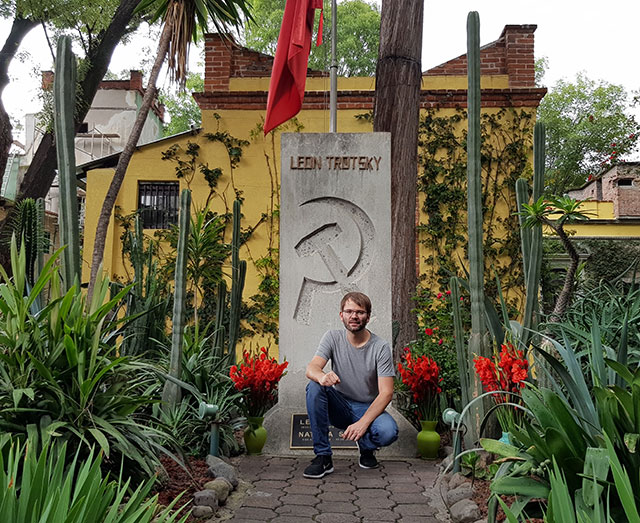
Olli Weiss in the garden of the Museo-Casa León Trotsky in Coyoacán, Mexico, August 2018. Won to Trotsky’s program, Olli never changed his revolutionary spirit, but fought to put it consistently into practice.
(Photo: Permanente Revolution)
Translated from the German.
Our comrade Oliver Weiss died on July 22. According to the medical report, the cause of death was repeated heart attacks when he collapsed while jogging. His utterly unexpected death was an incredible shock to his family, his girlfriend, comrades, friends and everyone who knew him; he always seemed so fit and strong. Only a few weeks earlier he had celebrated his 34th birthday. The terrible death of Comrade Olli is a severe blow for the Internationalistische Gruppe/Germany, of which he was a founding member and a mainstay, and an incalculable loss for our League for the Fourth International, of which he was part of the international leadership. The working class worldwide has lost an enormously promising communist champion.
Olli was the organizer of the Internationalistische Gruppe and put out the newspaper of the IG, Permanente Revolution. He was also instrumental in the production of the newspaper of our Italian section, L´internazionalista, and played a leading role in the European work of the LFI. Comrades of the American, Brazilian and Mexican sections got to know him and his many talents when he was responsible for the technical functioning of the First International Conference of the League for the Fourth International in November 2017, as well as reporting on work in Europe. Many others have known him for nearly two decades in numerous struggles against exploitation and oppression and have been inspired by his dedication and straightforwardness.
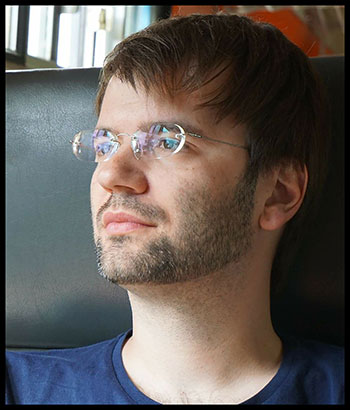 Olli Weiss, a
revolutionary class fighter for the oppressed. (Photo: Permanente Revolution)
Olli Weiss, a
revolutionary class fighter for the oppressed. (Photo: Permanente Revolution)We all mourn his death. Our tears and fury will only strengthen us in the conviction to fight with increased commitment for a reforged Fourth International, the revolutionary International to which Olli Weiss wholeheartedly devoted his all-too-short life. This is the greatest honor we can pay to our fallen comrade.
Olli was born to a proletarian family in East Germany when it was a workers state (the German Democratic Republic, or DDR). Experiencing the disaster of “democratic” capitalist counterrevolution as a child gave Olli an appreciation of the enormous gains for workers, women and the oppressed that had been made possible by the overthrow of capitalism and a collectivized planned economy, despite mismanagement and undercutting by the Stalinist bureaucracy. Very early in life he started searching for a political program capable of ending capitalism’s oppression and exploitation around the globe. At the age of 15 Olli had gained enough political experience and knowledge to see through the radical pretensions of the reformist anarchist and anti-globalization milieus that had initially attracted him. It was the ideas of revolutionary Trotskyism that really made sense of the world as he experienced it.
With the intention of fighting for the Bolshevik politics of Leon Trotsky, Olli joined the Spartakist Youth in early 2002 and a year later the Spartakist Workers Party of Germany (SpAD), the affiliate of the International Communist League (ICL). For three decades, the ICL represented genuine Trotskyism until, after the counterrevolution in the DDR, the USSR and other East European deformed workers states around 1989-1992, it was overcome by the spirit of defeatism and took leave of its former revolutionary program in 1996. Although the ICL was at the point Olli joined only a shell of its former self, its pronouncedly revolutionary past inspired Olli, particularly the then-revolutionary ICL’s intervention for defense of the DDR against capitalist counterrevolution and for proletarian political revolution to oust the Stalinist bureaucracy.
As Olli later wrote when he joined the League for the Fourth International in 2017, “After nearly a year and a half of discussion and joint work, I am convinced that the LFI is what I thought the ICL was when I became a member of the Berlin Spartacist Youth in early 2002 and the SpAD in 2003.” Won to Trotsky’s program, despite the revisions, deviations and rejection by the ICL, Olli never changed his revolutionary spirit, but fought to put it consistently into practice.
Within the SpAD, Olli was always very “hands-on” in undertaking tasks and carried them out in a professional manner. At the age of 20 he took over the production of its newspaper, which he continued to do conscientiously for the next 12 years. Olli soon became organizer of the youth group of the Berlin SpAD, and then joined the leadership of the local. In 2006 he was elected to the central committee of the organization. As one of his former comrades remarked, “despite his independence of thought and action being anathema to ICL internal operations, his aptness in whatever he did meant that the SpAD’s leadership preferred to try to coopt him.” Still:
“Olli was unique in that he didn’t bow easily to pressure. He took his time to formulate where he stood on political issues. He was not easily convinced and he stood up for his convictions. We are often tempted to describe such actions as bravery. I don’t think that Olli thought of it this way. I think that he simply said what he thought and did what he said.”
This straightforward way of thinking and acting later attracted Olli to the League for the Fourth International, he remarked, as he was particularly impressed by the Brazilian comrades’ motto of “the unity of deeds and words.”
 Olli actively mobilized to defend Eleonora Roldán Mendívil,
slanderously accused of "anti-Semitism" for defending the
rights of the Palestinians.
Olli actively mobilized to defend Eleonora Roldán Mendívil,
slanderously accused of "anti-Semitism" for defending the
rights of the Palestinians. Olli was always an activist in the best sense of the word, who fought stubbornly against the pseudo-Trotskyists, but was attentive to possible contradictions that would allow the true content of their inconsistencies and betrayals to be demonstrated in struggle. This often distinguished him from the ICL's predilection to lecture the working class and the left (and when they didn’t listen, to lecture themselves) with abstract pulpit sermons. He strongly defended various leftists who had been attacked for years, often physically, by the so-called “anti-German” proponents of Zionism. Olli was remembered at his funeral by left-wing lecturer Eleonora Roldán Mendívil at the Free University of Berlin, who was dismissed from her teaching post because of slanderous accusations of "anti-Semitism" (for defending the rights of the Palestinians). One of the first campaigns Olli launched after joining the LFI was in Eleonora’s defense, including writing a powerful solidarity statement and fighting within his union to take class-struggle action.
Like others in the ICL, Olli often felt restricted, which he reacted to by throwing himself further into the work, among other things. As he wrote in his application for membership in the LFI: “I had been critical of certain tendencies of the SpAD for a long time (passivity; immediate 180° due to criticisms from the IS; office-bound existence; etc.), and I opposed some individual line changes (e.g., on executive office; not trying to explore opportunities in the DDR before the wall came down; etc.) and wrong positions (e.g., non-opposition to privatization, out-sourcing etc.) over the years.” But he had “harbored illusions that through corrections here and there, and a transition of younger, less burned-out cadres into central positions, a kind of self-reform of the ICL could take place, and that I just had to hang in there, fight on selected issues that I might be able to win, and bide my time.”
So, for example, on the ICL’s newly coined principle that it is a betrayal for revolutionaries to run for executive office, even if they use the platform of the election campaign to spread communist principles and refuse to take such executive positions in the capitalist state, in 2007 Olli wrote bluntly:
“I remain unconvinced that the simple act of a revolutionary running for an executive office of the capitalist state always and under all circumstances means crossing the class line and therewith a betrayal of communism.”
He added: “I don't understand why everyone is suddenly so hot to take a new line so quickly. I find the discussion strange inasmuch as it doesn’t research our own election campaigns, for example New York in 1985. In my opinion, that would be a precondition for an assessment, whichever way it may go.” Naturally, Olli’s precisely on-target criticism was dismissed out of hand.1
Olli also rightly feared that the increasingly demoralized and cynical ICL leadership was rewriting its own history on the DDR in order to rid themselves of the obligation to apply the true lessons of this intervention to China, Cuba and the other remaining deformed workers states. While the ICL leadership wanted to retire into producing abstract propaganda from the comfort of their offices, Olli wanted his party to get up and ready itself to again carry out the kind of bold fight that it had waged in the DDR, in all the remaining deformed workers states.
It was in this context that in November 2010, Olli put forward a motion to strike the claim in the main document of the Sixth Conference of the ICL (2010) that the document of the Second Conference (1992) had made an error in declaring that the German section should have tried to “get appropriate propaganda into the hands of political activists in the DDR” even before the fall of the Berlin Wall in November 1989. How could one simply deny such a self-evident statement? he asked. And especially with the (false) statement that all opposition groups were controlled by the church, thereby equating informal pro-socialist circles with conscious counter-revolutionaries? Here he struck a nerve regarding the ICL's 1989-90 intervention against the capitalist reunification of Germany and for a proletarian political revolution in the DDR.
This first-ever intervention of a Trotskyist International against imperialist-led counterrevolutionary forces in a tottering deformed workers state was one of the ICL’s most outstanding accomplishments – even though, due to the balance of power, the working class ultimately suffered a world-historic defeat. The ICL was able to undertake this intervention because it still stood on the ground of revolutionary Trotskyism at the time. It was equipped with Trotsky’s analysis of the Stalinist bureaucracy as a contradictory, petty-bourgeois stratum parasitically administering and resting on the foundations of the workers state. Later, seized by the defeatism of the bourgeois thesis of a “death of communism,” the ICL abandoned this foundation of Trotskyism. Instead, it embraced the delusion that the fragile Stalinist caste, rather than the powerful imperialist bourgeoisie, “led the counterrevolution.”
This anti-Marxist assertion served as a “theoretical” rationale for the purge of the ICL cadres who later founded the LFI, and despite much shilly-shallying and rotten compromises to cover it up, it remains the line of the latter-day ICL in its Declaration of Principles. As Olli stressed, on this basis these former Trotskyists could never successfully intervene against a budding counterrevolution, or in an incipient proletarian political revolution, in the remaining deformed workers states (China, Cuba, etc.). But in fact, the abstentionist ICL, which has long since taken its leave from the class struggle, does not want to do such a thing anymore, having sunk so deep in their easy chairs. Olli lost that fight in the ICL, but in the LFI he found the party that shares both his understanding of the Trotskyist program for the deformed workers states and the courage to carry it out.
Olli’s last fight in the ICL was on the refugee and immigrant issue, in 2015-16. As he later wrote, “the stubborn insistence [of the ICL] on not opposing the Dublin III fast-track deportation law, and opposing calls for asylum for Syrians as liberal … was something that I knew I could not possibly uphold in public, even if I opposed it internally. I did not want to be associated with a social-chauvinist position towards refugees.” Thus he “arrived at the conclusion that the ICL was lost for revolution.”
It was “the sharp and thoughtful declaration of the Better-Late-Than-Never Faction,” which resulted in their immediate expulsion, and the powerful statement of the Italian comrades that helped him “connect the dots” and “make sense of what went wrong with the ICL.” After studying the founding documents of the League for the Fourth International, Olli wrote in his application for membership in the LFI: “I have realized that the ICL ceased to be a revolutionary organization long before I even joined it, and that the LFI continues today what Spartacism used to stand for.”
 The first issue of Permanente Revolution,
since August 2017 the newspaper of the Internationalistische
Gruppe, the German section of the League for the Fourth
International.
The first issue of Permanente Revolution,
since August 2017 the newspaper of the Internationalistische
Gruppe, the German section of the League for the Fourth
International. After the founding of the Internationalistische Gruppe in August 2017, Olli’s main work – on top of organizing the entire activity of the German section (!) – was production of the newspaper. He pushed for the name Permanente Revolution, appropriating the title of the newspaper of the German Trotskyists in the early 1930s, which printed Trotsky’s incisive analyses and calls for a united front of workers organizations to fight the fascists. Olli’s meticulous work was highlighted in the very professionally produced issues of the LFI's German and Italian publications. He was firmly convinced that a sloppy-looking, ugly newspaper, leaflet, poster or banner basically reflected contempt for readers. It would also undercut our promise of overturning capitalist society and creating a new, just socialist society.
Olli was key to bringing a class-struggle perspective to striking students and workers at the Free University of Berlin, where he completed his undergraduate and postgraduate studies, for example in the struggles of the student assistants at the Free University who are paid starvation wages for their work to keep libraries and offices running. He always warned in assemblies against placing any trust in the capitalist SPD/Left Party/Green Berlin Senate (city government). “The Social Democrats of the SPD and Left Party (not to mention the bourgeois Greens) are not only no lesser evil than the CDU and FDP – in fact, they are much more effective at ramming through anti-social austerity measures,” he wrote in a leaflet (April 2018). He criticized the “stop-and-go” strategy of the trade-union bureaucracy with its endless ineffective warning strikes, and vigorously advocated organizing pickets to shut down the library during the TVStud strike in January 2018.
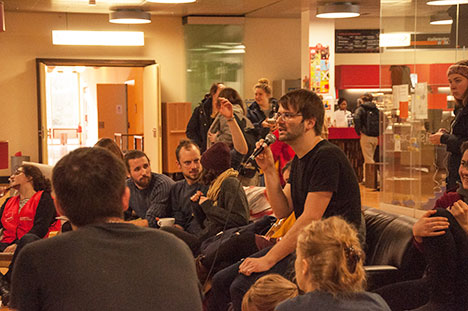 Olli speaking at a meeting
of the TVStud strikers. (Photo:
Janis Garnet)
Olli speaking at a meeting
of the TVStud strikers. (Photo:
Janis Garnet)Olli deeply absorbed Lenin’s admonition in What Is To Be Done? that the goal of the professional revolutionary is not to be a trade-union secretary but a tribune of the people denouncing all cases of oppression, capitalist exploitation and police arbitrariness. He wrote articles on the African refugee Oury Jalloh, who was burned to death in a police cell in Dessau in 2005, and on the need to mobilize working-class power for refugee rights and to prevent deportations that appeared in the Streikkurier strike newspaper. After the brutal attack on the son of our comrade Dr. Arturo Villalobos in Oaxaca, Mexico in May 2018, in a few days Olli won the backing of striking students and hospital staff in Berlin for the international protest campaign. Photos of their solidarity action were immediately sent to Mexico, where they demonstrated that the comrades under attack were not alone.
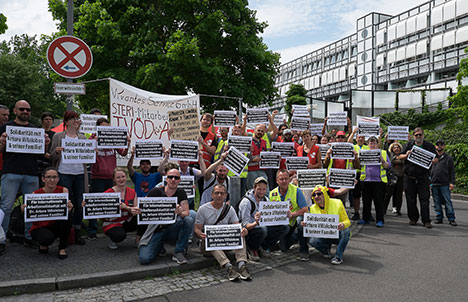
Olli (center, in front of banner) mobilized striking hospital workers in solidarity with Dr. Arturo Villalobos in Oaxaca, Mexico over the torture of his son, 15 May 2018. (Photo: Janis Garnet)
In evidence of his deep-rooted Leninism, Olli’s last public actions in July were participating in demonstrations in defense of two women doctors in Berlin who were punished under the Paragraph 219a law for advertising their abortion services, and a rally in defense of Captain Carole Rackete who was arrested for rescuing refugees in the Mediterranean Sea. In June Olli also organized comrades to mobilize against the closure of the Wombat’s Hostel in Berlin and in support of its workers against a union-busting campaign. While opportunist leftists – like the right-centrists of the Revolutionary Internationalist Organization (RIO)2 – as usual appealed to the “leftist” Berlin city government, the Internationalistische Gruppe addressed itself to the Berlin working class, calling for occupation of the facility.
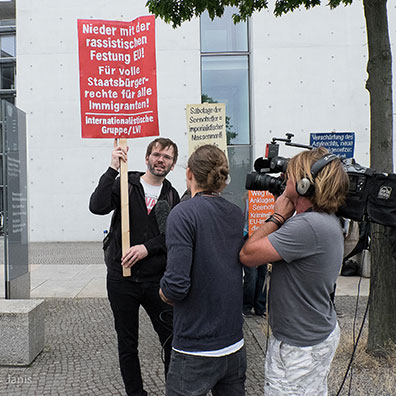 Olli being interviewed
during demonstration in defense of Sea Watch ship’s captain
Carola Rackete, 6 July 2019. (Photo:
Janis Garnet)
Olli being interviewed
during demonstration in defense of Sea Watch ship’s captain
Carola Rackete, 6 July 2019. (Photo:
Janis Garnet)Olli Weiss was what Leninists strive to be, a professional revolutionary. This includes the gift of summarizing all essential points in just under three minutes, the usual speaking time we are conceded at rallies and in assemblies (if we aren’t simply silenced). When in December 2018 he delivered a brief speech at a RIO-organized demonstration in defense of the Yellow Vests in France, Olli gave a concise call for defense of the movement against police repression; for polarizing it along class lines by the necessary proletarian revolutionary leadership; for defense of immigrants and refugees by the working class, and to demand access to higher education. He then exposed, to the displeasure of the organizers, the “democratic” tinkering with the French constitution raised by RIO’s French co-thinkers and other opportunists as a distraction from the proletarian revolution.
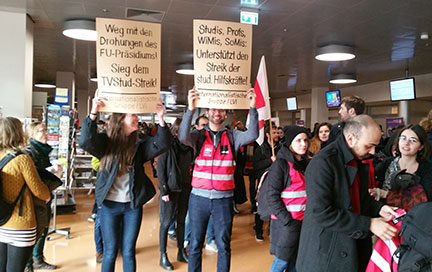 The Internationalistische Gruppe marching
during the TVStud strike of student assistants at Berlin's
Free University, 16 January 2018. (Photo: Permanente Revolution)
The Internationalistische Gruppe marching
during the TVStud strike of student assistants at Berlin's
Free University, 16 January 2018. (Photo: Permanente Revolution)As this example shows, Olli’s activism, like his attention to detail in the production of propaganda, was closely linked to his dedication to programmatic clarity and readiness for political debate. He was always very well informed about the ostensibly revolutionary organizations. At this year's Lutte Ouvrière Fête in France in early June, he along with young comrades had polemical discussions with members of various currents. He defended Leninist and Trotskyist positions with the called-for severity, but never twisted the political line of the opponents, as the ICL often does to make a cheap shot. He knew from his own experience that good militants can also be found in opportunist and rotten organizations, and that they can only be won with honest polemics.
Everyone who knew Olli in his political activity noted at least three things. First of all, the incredible breadth of his talents. He wrote, gave speeches, produced the newspaper and leaflets, printed and distributed them, organized demos, painted banners, was key to providing the technical infrastructure of international conferences (both for the ICL and the LFI!), and more. A longtime comrade said he was “a great organizer and thinker.” A young contact, who learned a lot from him, noticed, in mourning, “for me he was a titan.” Later he added, “Olli was phenomenal.” So he was.
Secondly, Olli’s great enthusiasm was contagious, especially when he was convinced he was fighting for the right cause. All of us in the League for the Fourth International perceived how he threw himself into every task. A former comrade of his, who had disputes with Olli inside the ICL (and who honestly admitted to having sometimes treated him bureaucratically), said: “I believe that Olli must have felt relieved when he turned his back on the ICL and shortly thereafter joined the LFI. It must have felt liberating for him to find a collective of comrades with whom he could align his strong political beliefs and actions.” His compañera said movingly, “I’m glad that he had found you in his life.”
And third, it was recognized by all that he was always decent, straightforward, without cynicism and evasive maneuvers, “brutally honest, with others and with himself.” As one comrade remarked, “he always tried to convince, he was always honest, never manipulative.”
Olli Weiss was a young cadre and leader who vibrantly embodied our hopes, with revolutionary optimism and determination. He was an internationalist to the core, travelling widely, from China to Latin America. He was an extremely intelligent and talented young person who loved life, had many interests, but knew where he wanted to go and pursued that goal with determination, while always lending a hand when needed by anyone. He was a person who understood that telling the truth and upholding the real principles of revolutionary Marxism was the only way to be true to the great cause he had embraced, and therefore to himself.
Olli’s death brings to mind the tragedy of another young comrade, Fernando López in New York, an immigrant worker, union organizer and communist who fell to his death as he was facing deportation.3 In both cases we lost extremely valuable leaders who contributed so much, and had so much more to contribute to the revolutionary cause.
At a meeting of a dozen supporters and friends of the Internationalistische Gruppe on July 28 to inform them about the death of Olli and remember him, letters were read from the Nucleo Internazionalista d’Italia and Trabajadores Internacionales Clasistas in the USA. The well-known words of Bertolt Brecht were quoted:
“The weak do not fight. The strong fight for perhaps an hour. Those who are even stronger fight for many years. But the strongest are those who fight all their lives. They are indispensable.”
Olli Weiss was one of those who are indispensable, and irreplaceable. He dedicated his whole life to the struggle for communism. No single one of us can do everything he did, we have to gather our strength to act together. Olli was known for his quick wit, engaging and effective style of argumentation and unwavering perseverance in upholding the truth in small things and big things. The impact of his cutting interventions, patient explanations and demonstrations of revolutionary politics in action will continue far beyond his death, as those inspired by his infectious enthusiasm for revolutionary politics will continue to carry his struggle forward.
In Spanish it is often said at the death of a compañero that the deceased is ¡presente! The hard truth is that Comrade Olli is no longer with us. Yet his ideals, his commitment to the oppressed and exploited, his revolutionary convictions, his Trotskyist and Leninist program, are alive as ever and serve as inspiration to all of us in the struggle for the liberation of humanity.
All honor to Olli Weiss! Long live the Fourth International!
- 1. See his document, “If Left Communism Is an Infantile Disorder, Then What Is ‘Left Trotskyism’?” 19 January 2007.
- 2. Internationally affiliated with the Fracción Trotskista, led by the Argentine PTS.
- 3. See “Fernando López, 1973-1999: Comrade, Internationalist, Revolutionary,” The Internationalist No. 7, April-May 1999.
